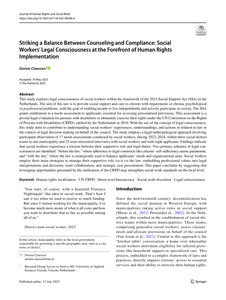This study explores legal consciousness of social workers within the framework of the 2015 Social Support Act (SSA) in the Netherlands. The aim of this law is to provide social support and care to citizens with impairments or chronic psychological or psychosocial problems, with the goal of enabling people to live independently and actively participate in society. The SSA grants entitlement to a needs assessment to applicants, essential for accessing personalized provisions. This assessment is a pivotal legal evaluation for persons with disabilities to ultimately exercise their rights under the UN Convention on the Rights of Persons with Disabilities (CRPD), ratified by the Netherlands in 2016. With the use of the concept of legal consciousness, this study aims to contribute to understanding social workers’ experiences, understandings, and actions in relation to law in the context of legal decision-making on behalf of the council.
MULTIFILE

Project objectives Radicalisation research leads to ethical and legal questions and issues. These issues need to be addressed in way that helps the project progress in ethically and legally acceptable manner. Description of Work The legal analysis in SAFIRE addressed questions such as which behavior associated with radicalisation is criminal behaviour. The ethical issues were addressed throughout the project in close cooperation between the ethicists and the researchers using a method called ethical parallel research. Results A legal analysis was made about criminal law and radicalisation. During the project lively discussions were held in the research team about ethical issues. An ethical justification for interventions in radicalisation processes has been written. With regard to research ethics: An indirect informed consent procedure for interviews with (former) radicals has been designed. Practical guidelines to prevent obtaining information that could lead to indirect identification of respondents were developed.
DOCUMENT

The HCR-20V3 is a violence risk assessment tool that is widely used in forensic clinical practice for risk management planning. The predictive value of the tool, when used in court for legal decisionmaking, is not yet intensively been studied and questions about legal admissibility may arise. This article aims to provide legal and mental health practitioners with an overview of the strengths and weaknesses of the HCR-20V3 when applied in legal settings. The HCR-20V3 is described and discussed with respect to its psychometric properties for different groups and settings. Issues involving legal admissibility and potential biases when conducting violence risk assessments with the HCR-20V3 are outlined. To explore legal admissibility challenges with respect to the HCR-20V3, we searched case law databases since 2013 from Australia, Canada, Ireland, the Netherlands, New Zealand, the UK, and the USA. In total, we found 546 cases referring to the HCR-20/HCR-20V3. In these cases, the tool was rarely challenged (4.03%), and when challenged, it never resulted in a court decision that the risk assessment was inadmissible. Finally, we provide recommendations for legal practitioners for the cross-examination of risk assessments and recommendations for mental health professionals who conduct risk assessments and report to the court. We conclude with suggestions for future research with the HCR-20V3 to strengthen the evidence base for use of the instrument in legal contexts.
DOCUMENT
